|
|
| Line 1: |
Line 1: |
| | The [https://en.wikipedia.org/wiki/Siemens Siemens Corperation] has, throughout the years produced many things, among them was the very First [[Electron Microsocpe]]. The history of the Electron Microscope started with Siemenes and Ernst Ruska, together with his research team, they created the very first Electron Microscopes. | | The [https://en.wikipedia.org/wiki/Siemens Siemens Corperation] has, throughout the years produced many things, among them was the very First [[Electron Microsocpe]]. The history of the Electron Microscope started with Siemenes and Ernst Ruska, together with his research team, they created the very first Electron Microscopes. |
| | | | |
| − | == Models ==
| + | = Models = |
| | Siemens, as the company responsible for the invention of the Electron Microscope has produced many models throughout the years, also selling a rebadged version of the [[ETEC Autoscan| Etec Autoscan]] which was sold under the Siemens name outside the United States. Most of their models however where of the Transmission kind, mostly due to Ernst Ruskas Prescience. | | Siemens, as the company responsible for the invention of the Electron Microscope has produced many models throughout the years, also selling a rebadged version of the [[ETEC Autoscan| Etec Autoscan]] which was sold under the Siemens name outside the United States. Most of their models however where of the Transmission kind, mostly due to Ernst Ruskas Prescience. |
| | | | |
| Line 2,855: |
Line 2,855: |
| | |} | | |} |
| | | | |
| − | [[Category:Pages using DynamicPageList parser function]]
| + | |
| | | | |
| | == References == | | == References == |
Revision as of 19:07, 19 September 2021
The Siemens Corperation has, throughout the years produced many things, among them was the very First Electron Microsocpe. The history of the Electron Microscope started with Siemenes and Ernst Ruska, together with his research team, they created the very first Electron Microscopes.
Models
Siemens, as the company responsible for the invention of the Electron Microscope has produced many models throughout the years, also selling a rebadged version of the Etec Autoscan which was sold under the Siemens name outside the United States. Most of their models however where of the Transmission kind, mostly due to Ernst Ruskas Prescience.
Transmission Electron Microscops
| High Speed Oscillograph Electron Source
|
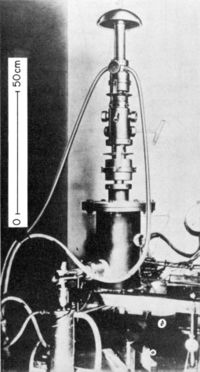
|
| General
|
| Year
|
1933
|
| Successor
|
Prototype 1
|
| Magnification Range
|
N/A
|
| Magnification Gauge Type
|
N/A
|
| Specemin Chamber Pressure
|
10⁻3 Torr
|
| Power Consumption
|
|
| System Weight
|
|
|
| Electrion Source
|
| Accelerator Type
|
Kanalstrahlrohr
|
| Cathode Type
|
Gas Discharge
|
| Accelerating Voltage
|
75 KV
|
| Stability
|
|
| Cathode Heating Methode
|
N/A
|
| Alignment Methode
|
|
|
| Condensor
|
| Number of Condensor Lenses
|
2
|
| Current Stability
|
|
| Stigmator
|
N/A
|
| Minimum Spot Size Diameter
|
|
| Condensor Alignment
|
|
| Lens Type
|
Electromagnetic
|
|
| Stage
|
| Holder Type
|
Cartridge, Top Entry
|
| X, Y Travel Range
|
N/A
|
|
| Objective Lens
|
| Focal Length
|
N/A
|
| Adjustment Range
|
N/A
|
| Spherical Error
|
N/A
|
| Current Stability
|
N/A
|
| Stigmator
|
N/A
|
| Alignment Aids
|
N/A
|
| Point Resolution
|
N/A
|
| Lens Type
|
N/A
|
|
| Projective Lens
|
| Number of Projective Lens
|
N/A
|
| Current Stability
|
N/A
|
| Polpeace Configuration
|
N/A
|
| Avalible Polpeace Magnifications
|
N/A
|
| Alignment
|
N/A
|
| Lens Type
|
N/A
|
|
| Prototyp 1
|
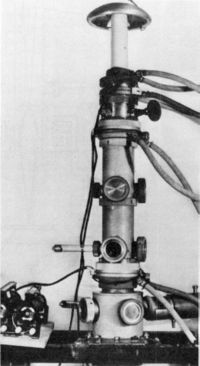
|
| General
|
| Year
|
1933
|
| Successor
|
Prototype 2
|
| Magnification Range
|
|
| Magnification Gauge Type
|
|
| Specemin Chamber Pressure
|
10⁻3 Torr
|
| Power Consumption
|
|
| System Weight
|
|
|
| Electrion Source
|
| Accelerator Type
|
Kanalstrahlrohr
|
| Cathode Type
|
Gas Discharge
|
| Accelerating Voltage
|
75 KV
|
| Stability
|
|
| Cathode Heating Methode
|
N/A
|
| Alignment Methode
|
|
|
| Condensor
|
| Number of Condensor Lenses
|
1
|
| Current Stability
|
|
| Stigmator
|
|
| Minimum Spot Size Diameter
|
|
| Condensor Alignment
|
|
| Lens Type
|
Electromagnetic
|
|
| Stage
|
| Holder Type
|
Cartridge, Top Entry
|
| X, Y Travel Range
|
N/A
|
|
| Objective Lens
|
| Focal Length
|
|
| Adjustment Range
|
|
| Spherical Error
|
|
| Current Stability
|
|
| Stigmator
|
|
| Alignment Aids
|
|
| Point Resolution
|
500 Å [1]
|
| Lens Type
|
Electromagnetic
|
|
| Projective Lens
|
| Number of Projective Lens
|
1
|
| Current Stability
|
|
| Polpeace Configuration
|
Single Polpiece
|
| Avalible Polpeace Magnifications
|
|
| Alignment
|
|
| Lens Type
|
Electromagnetic
|
|
| Prototyp 2
|
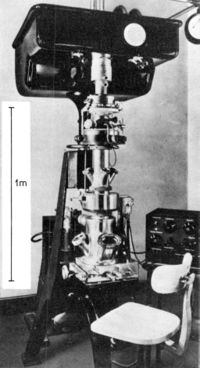
|
| General
|
| Year
|
1938
|
| Successor
|
Übermikroskop
|
| Magnification Range
|
|
| Magnification Gauge Type
|
|
| Specemin Chamber Pressure
|
10⁻3 Torr?
|
| Power Consumption
|
|
| System Weight
|
|
|
| Electrion Source
|
| Accelerator Type
|
Kanalstrahlrohr
|
| Cathode Type
|
Gas Discharge
|
| Accelerating Voltage
|
75 KV
|
| Stability
|
|
| Cathode Heating Methode
|
N/A
|
| Alignment Methode
|
|
|
| Condensor
|
| Number of Condensor Lenses
|
1
|
| Current Stability
|
|
| Stigmator
|
|
| Minimum Spot Size Diameter
|
|
| Condensor Alignment
|
|
| Lens Type
|
Electromagnetic
|
|
| Stage
|
| Holder Type
|
Cartridge, Top Entry
|
| X, Y Travel Range
|
N/A
|
|
| Objective Lens
|
| Focal Length
|
|
| Adjustment Range
|
|
| Spherical Error
|
|
| Current Stability
|
|
| Stigmator
|
|
| Alignment Aids
|
|
| Point Resolution
|
100 Å [2]
|
| Lens Type
|
Electromagnetic
|
|
| Projective Lens
|
| Number of Projective Lens
|
1
|
| Current Stability
|
|
| Polpeace Configuration
|
Single Polpiece
|
| Avalible Polpeace Magnifications
|
|
| Alignment
|
|
| Lens Type
|
Electromagnetic
|
|
| Übermikroskop
|
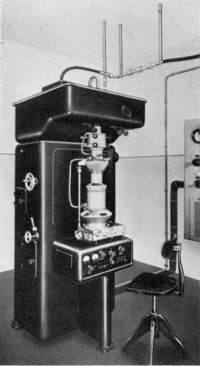
|
| General
|
| Year
|
1939
|
| Successor
|
ÜM100
|
| Magnification Range
|
|
| Magnification Gauge Type
|
|
| Specemin Chamber Pressure
|
10⁻4 Torr?
|
| Power Consumption
|
|
| System Weight
|
|
|
| Electrion Source
|
| Accelerator Type
|
Kanalstrahlrohr
|
| Cathode Type
|
Gas Discharge
|
| Accelerating Voltage
|
75 KV
|
| Stability
|
|
| Cathode Heating Methode
|
N/A
|
| Alignment Methode
|
|
|
| Condensor
|
| Number of Condensor Lenses
|
1
|
| Current Stability
|
|
| Stigmator
|
|
| Minimum Spot Size Diameter
|
|
| Condensor Alignment
|
|
| Lens Type
|
Electromagnetic
|
|
| Stage
|
| Holder Type
|
Cartridge, Top Entry
|
| X, Y Travel Range
|
|
|
| Objective Lens
|
| Focal Length
|
|
| Adjustment Range
|
|
| Spherical Error
|
|
| Current Stability
|
|
| Stigmator
|
|
| Alignment Aids
|
|
| Point Resolution
|
100 Å [3]
|
| Lens Type
|
Electromagnetic
|
|
| Projective Lens
|
| Number of Projective Lens
|
1
|
| Current Stability
|
|
| Polpeace Configuration
|
Single Polpiece
|
| Avalible Polpeace Magnifications
|
|
| Alignment
|
|
| Lens Type
|
Electromagnetic
|
|
| ÜM100 Gen1
|
|
|
| General
|
| Year
|
1939
|
| Successor
|
ÜM100
|
| Magnification Range
|
|
| Magnification Gauge Type
|
|
| Specemin Chamber Pressure
|
10⁻4 Torr?
|
| Power Consumption
|
|
| System Weight
|
|
|
| Electrion Source
|
| Accelerator Type
|
Electron Gun
|
| Cathode Type
|
Tungsten Hairpin
|
| Accelerating Voltage
|
55, 70, 85, 100 KV
|
| Stability
|
|
| Cathode Heating Methode
|
|
| Alignment Methode
|
|
|
| Condensor
|
| Number of Condensor Lenses
|
1
|
| Current Stability
|
|
| Stigmator
|
|
| Minimum Spot Size Diameter
|
|
| Condensor Alignment
|
|
| Lens Type
|
Electromagnetic
|
|
| Stage
|
| Holder Type
|
Cartridge, Top Entry
|
| X, Y Travel Range
|
|
|
| Objective Lens
|
| Focal Length
|
|
| Adjustment Range
|
|
| Spherical Error
|
|
| Current Stability
|
|
| Stigmator
|
|
| Alignment Aids
|
|
| Point Resolution
|
|
| Lens Type
|
Electromagnetic
|
|
| Projective Lens
|
| Number of Projective Lens
|
1
|
| Current Stability
|
|
| Polpeace Configuration
|
Single Polpiece
|
| Avalible Polpeace Magnifications
|
|
| Alignment
|
|
| Lens Type
|
Electromagnetic
|
|
| ÜM100
|
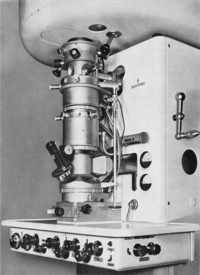
|
| General
|
| Year
|
1949
|
| Successor
|
Elmiskop I
|
| Magnification Range
|
|
| Magnification Gauge Type
|
|
| Specemin Chamber Pressure
|
10⁻4 Torr?
|
| Power Consumption
|
|
| System Weight
|
|
|
| Electrion Source
|
| Accelerator Type
|
Electron Gun
|
| Cathode Type
|
Tungsten Hairpin
|
| Accelerating Voltage
|
40, 60, 80, 100 KV
|
| Stability
|
|
| Cathode Heating Methode
|
|
| Alignment Methode
|
|
|
| Condensor
|
| Number of Condensor Lenses
|
1
|
| Current Stability
|
|
| Stigmator
|
|
| Minimum Spot Size Diameter
|
|
| Condensor Alignment
|
|
| Lens Type
|
Electromagnetic
|
|
| Stage
|
| Holder Type
|
Cartridge, Top Entry
|
| X, Y Travel Range
|
|
|
| Objective Lens
|
| Focal Length
|
|
| Adjustment Range
|
|
| Spherical Error
|
|
| Current Stability
|
|
| Stigmator
|
|
| Alignment Aids
|
|
| Point Resolution
|
|
| Lens Type
|
Electromagnetic
|
|
| Projective Lens
|
| Number of Projective Lens
|
1
|
| Current Stability
|
|
| Polpeace Configuration
|
Single Polpiece
|
| Avalible Polpeace Magnifications
|
|
| Alignment
|
|
| Lens Type
|
Electromagnetic
|
|
| ÜM60
|
|
|
| General
|
| Year
|
1950
|
| Successor
|
Elmiskop II
|
| Magnification Range
|
|
| Magnification Gauge Type
|
|
| Specemin Chamber Pressure
|
10⁻4 Torr?
|
| Power Consumption
|
|
| System Weight
|
|
|
| Electrion Source
|
| Accelerator Type
|
Electron Gun
|
| Cathode Type
|
Tungsten Hairpin
|
| Accelerating Voltage
|
40, 50, 60 KV
|
| Stability
|
|
| Cathode Heating Methode
|
N/A
|
| Alignment Methode
|
|
|
| Condensor
|
| Number of Condensor Lenses
|
1
|
| Current Stability
|
|
| Stigmator
|
|
| Minimum Spot Size Diameter
|
|
| Condensor Alignment
|
|
| Lens Type
|
Electromagnetic
|
|
| Stage
|
| Holder Type
|
Cartridge, Top Entry
|
| X, Y Travel Range
|
|
|
| Objective Lens
|
| Focal Length
|
|
| Adjustment Range
|
|
| Spherical Error
|
|
| Current Stability
|
|
| Stigmator
|
|
| Alignment Aids
|
|
| Point Resolution
|
|
| Lens Type
|
Electromagnetic
|
|
| Projective Lens
|
| Number of Projective Lens
|
1
|
| Current Stability
|
|
| Polpeace Configuration
|
Single Polpiece
|
| Avalible Polpeace Magnifications
|
|
| Alignment
|
|
| Lens Type
|
Electromagnetic
|
|
| Elmiskop I
|
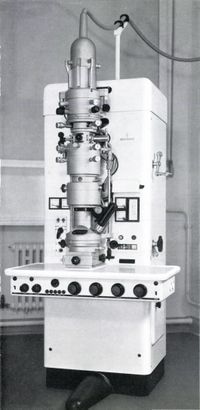
|
| General
|
| Year
|
1954
|
| Successor
|
Elmiskop IA
|
| Magnification Range
|
200x to 200,000x
|
| Magnification Gauge Type
|
Galvanometer
|
| Specemin Chamber Pressure
|
10⁻⁴ Torr
|
| Power Consumption
|
3.3 KVA
|
| System Weight
|
1200 Kg
|
|
| Electrion Source
|
| Accelerator Type
|
Single Stage Electron Gun
|
| Cathode Type
|
Tungsten Hairpin
|
| Accelerating Voltage
|
40, 60, 80, 100 KV
|
| Stability
|
2*10⁻⁵/min
|
| Cathode Heating Methode
|
AC
|
| Alignment Methode
|
X, Y, Mechanical
|
|
| Condensor
|
| Number of Condensor Lenses
|
2
|
| Current Stability
|
10⁻³/min
|
| Stigmator
|
Moveing Iron, Mechanical
|
| Minimum Spot Size Diameter
|
2000 nm
|
| Condensor Alignment
|
X, Y, and Tilt, Mechanical
|
| Lens Type
|
Electromagnetic
|
|
| Stage
|
| Holder Type
|
Cartridge, Top Entry
|
| X, Y Travel Range
|
± 0.8 mm
|
|
| Objective Lens
|
| Focal Length
|
2.8mm
|
| Adjustment Range
|
2.8mm to 7.4mm
|
| Spherical Error
|
3.3mm
|
| Current Stability
|
10⁻⁵/min
|
| Stigmator
|
Moveing Iron, Mechanical
|
| Alignment Aids
|
|
| Point Resolution
|
5 Å
|
| Lens Type
|
Electromagnetic
|
|
| Projective Lens
|
| Number of Projective Lens
|
1
|
| Current Stability
|
10⁻⁴/min
|
| Polpeace Configuration
|
4 Position Revolver
|
| Avalible Polpeace Magnifications
|
12.5:1, 31.2:1, 62.5:1, 125:1, 250:1
|
| Alignment
|
X, Y (via Rovolver Rotation) & Tilt, Mechanical
|
| Lens Type
|
Electromagnetic
|
|
| Elmiskop II Prototype
|
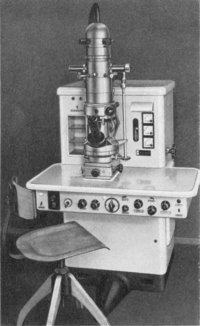
|
| General
|
| Year
|
1954
|
| Successor
|
Elmiskop II
|
| Magnification Range
|
|
| Magnification Gauge Type
|
Galvanometer
|
| Specemin Chamber Pressure
|
10⁻⁴ Torr
|
| Power Consumption
|
|
| System Weight
|
|
|
| Electrion Source
|
| Accelerator Type
|
Single Stage Electron Gun
|
| Cathode Type
|
Tungsten Hairpin
|
| Accelerating Voltage
|
40, 50, 60 KV
|
| Stability
|
style="text-align:center;"
|
| Cathode Heating Methode
|
AC
|
| Alignment Methode
|
X, Y, Mechanical
|
|
| Condensor
|
| Number of Condensor Lenses
|
0
|
| Current Stability
|
N/A
|
| Stigmator
|
|
| Minimum Spot Size Diameter
|
|
| Condensor Alignment
|
X, Y, and Tilt, Mechanical
|
| Lens Type
|
|
|
| Stage
|
| Holder Type
|
Cartridge, Top Entry
|
| X, Y Travel Range
|
± 0.8 mm
|
|
| Objective Lens
|
| Focal Length
|
|
| Adjustment Range
|
|
| Spherical Error
|
|
| Current Stability
|
3 * 10⁻⁵/min
|
| Stigmator
|
Moveing Iron, Mechanical
|
| Alignment Aids
|
|
| Point Resolution
|
25 Å [4]
|
| Lens Type
|
Electromagnetic
|
|
| Projective Lens
|
| Number of Projective Lens
|
1
|
| Current Stability
|
|
| Polpeace Configuration
|
4 Position Revolver
|
| Avalible Polpeace Magnifications
|
|
| Alignment
|
X, Y (via Rovolver Rotation) & Tilt, Mechanical
|
| Lens Type
|
Electromagnetic
|
|
| Elmiskop II
|
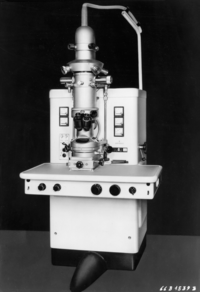
|
| General
|
| Year
|
1955
|
| Successor
|
Elmiskop 51
|
| Magnification Range
|
200x to 200,000x
|
| Magnification Gauge Type
|
|
| Specemin Chamber Pressure
|
10⁻⁴ Torr
|
| Power Consumption
|
2 KVA
|
| System Weight
|
700 Kg
|
|
| Electrion Source
|
| Accelerator Type
|
Single Stage Electron Gun
|
| Cathode Type
|
Tungsten Hairpin
|
| Accelerating Voltage
|
50 KV
|
| Stability
|
5.35*10⁻9/min
|
| Cathode Heating Methode
|
AC
|
| Alignment Methode
|
X, Y, Mechanical
|
|
| Condensor
|
| Number of Condensor Lenses
|
0
|
| Current Stability
|
N/A
|
| Stigmator
|
|
| Minimum Spot Size Diameter
|
|
| Condensor Alignment
|
X, Y, and Tilt, Mechanical
|
| Lens Type
|
|
|
| Stage
|
| Holder Type
|
Cartridge, Top Entry
|
| X, Y Travel Range
|
± 0.8 mm
|
|
| Objective Lens
|
| Focal Length
|
1.8mm
|
| Adjustment Range
|
|
| Spherical Error
|
|
| Current Stability
|
3 * 10⁻⁵/min
|
| Stigmator
|
Moveing Iron, Mechanical
|
| Alignment Aids
|
|
| Point Resolution
|
20 Å
|
| Lens Type
|
Electromagnetic
|
|
| Projective Lens
|
| Number of Projective Lens
|
1
|
| Current Stability
|
10⁻⁴/min
|
| Polpeace Configuration
|
4 Position Revolver
|
| Avalible Polpeace Magnifications
|
16.9:1, 69.9:1, 146:1, 300:1
|
| Alignment
|
X, Y (via Rovolver Rotation) & Tilt, Mechanical
|
| Lens Type
|
Electromagnetic
|
|
| Elmiskop 51 Prototyp
|
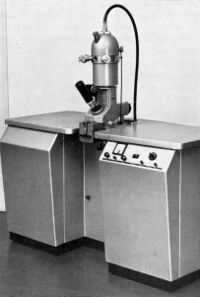
|
| General
|
| Year
|
1956
|
| Successor
|
Elmiskop 51
|
| Magnification Range
|
|
| Magnification Gauge Type
|
|
| Specemin Chamber Pressure
|
|
| Power Consumption
|
|
| System Weight
|
|
|
| Electrion Source
|
| Accelerator Type
|
Single Stage Electron Gun
|
| Cathode Type
|
Tungsten Hairpin
|
| Accelerating Voltage
|
50 KV
|
| Stability
|
|
| Cathode Heating Methode
|
AC
|
| Alignment Methode
|
X, Y, Mechanical
|
|
| Condensor
|
| Number of Condensor Lenses
|
0
|
| Current Stability
|
N/A
|
| Stigmator
|
|
| Minimum Spot Size Diameter
|
|
| Condensor Alignment
|
|
| Lens Type
|
|
|
| Stage
|
| Holder Type
|
Cartridge, Top Entry 9 position
|
| X, Y Travel Range
|
± 0.8 mm
|
|
| Objective Lens
|
| Focal Length
|
|
| Adjustment Range
|
|
| Spherical Error
|
|
| Current Stability
|
N/A
|
| Stigmator
|
Moveing Iron, Mechanical
|
| Alignment Aids
|
|
| Point Resolution
|
50 Å [5]
|
| Lens Type
|
Permanent Magnet
|
|
| Projective Lens
|
| Number of Projective Lens
|
1
|
| Current Stability
|
N/A
|
| Polpeace Configuration
|
4 Position Revolver
|
| Avalible Polpeace Magnifications
|
|
| Alignment
|
X, Y (via Rovolver Rotation) & Tilt, Mechanical
|
| Lens Type
|
Permanent Magnet
|
|
| Elmiskop IA
|

|
| General
|
| Year
|
1961
|
| Successor
|
Elmiskop 101
|
| Magnification Range
|
200x to 200,000x
|
| Magnification Gauge Type
|
Galvanometer
|
| Specemin Chamber Pressure
|
10⁻5Torr
|
| Power Consumption
|
|
| System Weight
|
|
|
| Electrion Source
|
| Accelerator Type
|
Single Stage Electron Gun
|
| Cathode Type
|
Tungsten Hairpin
|
| Accelerating Voltage
|
40, 60, 80, 100 KV
|
| Stability
|
2*10⁻⁵/min
|
| Cathode Heating Methode
|
AC
|
| Alignment Methode
|
X, Y, Mechanical
|
|
| Condensor
|
| Number of Condensor Lenses
|
2
|
| Current Stability
|
|
| Stigmator
|
Moveing Iron, Mechanical
|
| Minimum Spot Size Diameter
|
|
| Condensor Alignment
|
X, Y, and Tilt, Mechanical
|
| Lens Type
|
Electromagnetic
|
|
| Stage
|
| Holder Type
|
Cartridge, Top Entry
|
| X, Y Travel Range
|
± 0.8 mm
|
|
| Objective Lens
|
| Focal Length
|
|
| Adjustment Range
|
|
| Spherical Error
|
|
| Current Stability
|
|
| Stigmator
|
Moveing Iron, Mechanical
|
| Alignment Aids
|
|
| Point Resolution
|
4 Å
|
| Lens Type
|
Electromagnetic
|
|
| Projective Lens
|
| Number of Projective Lens
|
1
|
| Current Stability
|
|
| Polpeace Configuration
|
4 Position Revolver
|
| Avalible Polpeace Magnifications
|
12.5:1, 31.2:1, 62.5:1, 125:1, 250:1?
|
| Alignment
|
X, Y (via Rovolver Rotation) & Tilt, Mechanical
|
| Lens Type
|
Electromagnetic
|
|
| Elmiskop 51
|
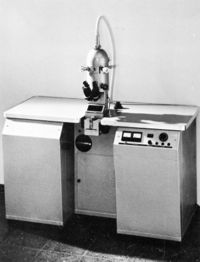
|
| General
|
| Year
|
1956
|
| Successor
|
Elmiskop 51
|
| Magnification Range
|
|
| Magnification Gauge Type
|
|
| Specemin Chamber Pressure
|
|
| Power Consumption
|
|
| System Weight
|
|
|
| Electrion Source
|
| Accelerator Type
|
Single Stage Electron Gun
|
| Cathode Type
|
Tungsten Hairpin
|
| Accelerating Voltage
|
50 KV
|
| Stability
|
|
| Cathode Heating Methode
|
AC
|
| Alignment Methode
|
X, Y, Mechanical
|
|
| Condensor
|
| Number of Condensor Lenses
|
0
|
| Current Stability
|
N/A
|
| Stigmator
|
|
| Minimum Spot Size Diameter
|
|
| Condensor Alignment
|
|
| Lens Type
|
|
|
| Stage
|
| Holder Type
|
Cartridge, Top Entry 9 position
|
| X, Y Travel Range
|
± 0.8 mm
|
|
| Objective Lens
|
| Focal Length
|
|
| Adjustment Range
|
|
| Spherical Error
|
|
| Current Stability
|
N/A
|
| Stigmator
|
Moveing Iron, Mechanical
|
| Alignment Aids
|
|
| Point Resolution
|
25-50 Å Film Grain Dependent[6]
|
| Lens Type
|
Permanent Magnet
|
|
| Projective Lens
|
| Number of Projective Lens
|
1
|
| Current Stability
|
N/A
|
| Polpeace Configuration
|
4 Position Revolver
|
| Avalible Polpeace Magnifications
|
|
| Alignment
|
X, Y (via Rovolver Rotation) & Tilt, Mechanical
|
| Lens Type
|
Permanent Magnet
|
|
| Elmiskop 101
|
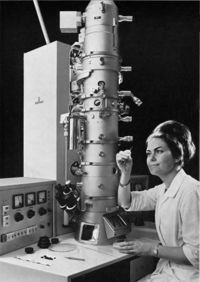
|
| General
|
| Year
|
1968
|
| Successor
|
Elmiskop 102
|
| Magnification Range
|
|
| Magnification Gauge Type
|
|
| Specemin Chamber Pressure
|
|
| Power Consumption
|
|
| System Weight
|
|
|
| Electrion Source
|
| Accelerator Type
|
Single Stage Electron Gun
|
| Cathode Type
|
Tungsten Hairpin
|
| Accelerating Voltage
|
40, 60, 80, 100, 125 KV
|
| Stability
|
|
| Cathode Heating Methode
|
|
| Alignment Methode
|
X, Y, Mechanical
|
|
| Condensor
|
| Number of Condensor Lenses
|
2
|
| Current Stability
|
|
| Stigmator
|
|
| Minimum Spot Size Diameter
|
|
| Condensor Alignment
|
|
| Lens Type
|
|
|
| Stage
|
| Holder Type
|
Cartridge
|
| X, Y Travel Range
|
± 0.8 mm
|
|
| Objective Lens
|
| Focal Length
|
|
| Adjustment Range
|
|
| Spherical Error
|
|
| Current Stability
|
|
| Stigmator
|
Moveing Iron, Mechanical
|
| Alignment Aids
|
|
| Point Resolution
|
3-5 Å [7]
|
| Lens Type
|
Electromagnetic
|
|
| Projective Lens
|
| Number of Projective Lens
|
1
|
| Current Stability
|
|
| Polpeace Configuration
|
2 Position Revolver
|
| Avalible Polpeace Magnifications
|
|
| Alignment
|
X, Y (via Rovolver Rotation) & Tilt, Mechanical
|
| Lens Type
|
Electromagnetic
|
|
| Elmiskop 102
|
|
|
| General
|
| Year
|
1972
|
| Successor
|
Elmiskop 103
|
| Magnification Range
|
|
| Magnification Gauge Type
|
|
| Specemin Chamber Pressure
|
|
| Power Consumption
|
|
| System Weight
|
|
|
| Electrion Source
|
| Accelerator Type
|
Single Stage Electron Gun
|
| Cathode Type
|
Tungsten Hairpin
|
| Accelerating Voltage
|
40, 60, 80, 100, 125 KV
|
| Stability
|
|
| Cathode Heating Methode
|
|
| Alignment Methode
|
X, Y, Mechanical
|
|
| Condensor
|
| Number of Condensor Lenses
|
2
|
| Current Stability
|
|
| Stigmator
|
|
| Minimum Spot Size Diameter
|
|
| Condensor Alignment
|
|
| Lens Type
|
|
|
| Stage
|
| Holder Type
|
Cartridge
|
| X, Y Travel Range
|
± 0.8 mm
|
|
| Objective Lens
|
| Focal Length
|
|
| Adjustment Range
|
|
| Spherical Error
|
|
| Current Stability
|
|
| Stigmator
|
Moveing Iron, Mechanical
|
| Alignment Aids
|
|
| Point Resolution
|
2 Å (Line) 3 Å (Point) [8]
|
| Lens Type
|
Electromagnetic
|
|
| Projective Lens
|
| Number of Projective Lens
|
1
|
| Current Stability
|
|
| Polpeace Configuration
|
1
|
| Avalible Polpeace Magnifications
|
|
| Alignment
|
X, Y (via Rovolver Rotation) & Tilt, Mechanical
|
| Lens Type
|
Electromagnetic
|
|
| Elmiskop 103
|
|
|
| General
|
| Year
|
|
| Successor
|
Elmiskop 104
|
| Magnification Range
|
|
| Magnification Gauge Type
|
|
| Specemin Chamber Pressure
|
|
| Power Consumption
|
|
| System Weight
|
|
|
| Electrion Source
|
| Accelerator Type
|
Single Stage Electron Gun?
|
| Cathode Type
|
Tungsten Hairpinß
|
| Accelerating Voltage
|
40, 60, 80, 100, 125 KV ?
|
| Stability
|
|
| Cathode Heating Methode
|
|
| Alignment Methode
|
X, Y, Mechanical
|
|
| Condensor
|
| Number of Condensor Lenses
|
2
|
| Current Stability
|
|
| Stigmator
|
|
| Minimum Spot Size Diameter
|
|
| Condensor Alignment
|
|
| Lens Type
|
|
|
| Stage
|
| Holder Type
|
Cartridge
|
| X, Y Travel Range
|
± 0.8 mm
|
|
| Objective Lens
|
| Focal Length
|
|
| Adjustment Range
|
|
| Spherical Error
|
|
| Current Stability
|
|
| Stigmator
|
|
| Alignment Aids
|
|
| Point Resolution
|
|
| Lens Type
|
Electromagnetic
|
|
| Projective Lens
|
| Number of Projective Lens
|
1
|
| Current Stability
|
|
| Polpeace Configuration
|
1
|
| Avalible Polpeace Magnifications
|
|
| Alignment
|
X, Y (via Rovolver Rotation) & Tilt, Mechanical
|
| Lens Type
|
Electromagnetic
|
|
| Elmiskop 104
|
|
|
| General
|
| Year
|
|
| Successor
|
none
|
| Magnification Range
|
|
| Magnification Gauge Type
|
|
| Specemin Chamber Pressure
|
|
| Power Consumption
|
|
| System Weight
|
|
|
| Electrion Source
|
| Accelerator Type
|
Single Stage Electron Gun?
|
| Cathode Type
|
Tungsten Hairpinß
|
| Accelerating Voltage
|
40, 60, 80, 100, 125 KV ?
|
| Stability
|
|
| Cathode Heating Methode
|
|
| Alignment Methode
|
X, Y, Mechanical
|
|
| Condensor
|
| Number of Condensor Lenses
|
2
|
| Current Stability
|
|
| Stigmator
|
|
| Minimum Spot Size Diameter
|
|
| Condensor Alignment
|
|
| Lens Type
|
|
|
| Stage
|
| Holder Type
|
Cartridge
|
| X, Y Travel Range
|
± 0.8 mm
|
|
| Objective Lens
|
| Focal Length
|
|
| Adjustment Range
|
|
| Spherical Error
|
|
| Current Stability
|
|
| Stigmator
|
|
| Alignment Aids
|
|
| Point Resolution
|
|
| Lens Type
|
Electromagnetic
|
|
| Projective Lens
|
| Number of Projective Lens
|
1
|
| Current Stability
|
|
| Polpeace Configuration
|
1
|
| Avalible Polpeace Magnifications
|
|
| Alignment
|
X, Y (via Rovolver Rotation) & Tilt, Mechanical
|
| Lens Type
|
Electromagnetic
|
|
| Elmiskop CT150
|
|
|
| General
|
| Year
|
1977
|
| Successor
|
none
|
| Magnification Range
|
|
| Magnification Gauge Type
|
|
| Specemin Chamber Pressure
|
|
| Power Consumption
|
|
| System Weight
|
|
|
| Electrion Source
|
| Accelerator Type
|
|
| Cathode Type
|
|
| Accelerating Voltage
|
|
| Stability
|
|
| Cathode Heating Methode
|
|
| Alignment Methode
|
|
|
| Condensor
|
| Number of Condensor Lenses
|
|
| Current Stability
|
|
| Stigmator
|
|
| Minimum Spot Size Diameter
|
|
| Condensor Alignment
|
|
| Lens Type
|
|
|
| Stage
|
| Holder Type
|
|
| X, Y Travel Range
|
|
|
| Objective Lens
|
| Focal Length
|
|
| Adjustment Range
|
|
| Spherical Error
|
|
| Current Stability
|
|
| Stigmator
|
|
| Alignment Aids
|
|
| Point Resolution
|
|
| Lens Type
|
Electromagnetic
|
|
| Projective Lens
|
| Number of Projective Lens
|
|
| Current Stability
|
|
| Polpeace Configuration
|
|
| Avalible Polpeace Magnifications
|
|
| Alignment
|
|
| Lens Type
|
|
|
Scanning Transmission Electron Microscops
| Elmiskop ST100F
|
|
|
| General
|
| Year
|
1977
|
| Successor
|
none
|
| Magnification Range
|
50x - 10e7X
|
| Magnification Gauge Type
|
|
| Specemin Chamber Pressure
|
10e-7 mBar
|
| Power Consumption
|
|
| System Weight
|
|
|
| Electrion Source
|
| Accelerator Type
|
Crewe FE Electron Gun
|
| Cathode Type
|
Cold Field Emmision
|
| Accelerating Voltage
|
20, 40, 60, 80, 100 KV, (10 - 30 KV)
|
| Stability
|
2*10e-6
|
| Cathode Heating Methode
|
N/A
|
| Alignment Methode
|
|
|
| Condensor
|
| Number of Condensor Lenses
|
1
|
| Current Stability
|
2*10e-6
|
| Stigmator
|
|
| Minimum Spot Size Diameter
|
|
| Condensor Alignment
|
|
| Lens Type
|
Crewe Electrostatic
|
|
| Stage
|
| Holder Type
|
|
| X, Y Travel Range
|
+- 1 mm
|
|
| Objective Lens
|
| Focal Length
|
1.8 mm
|
| Adjustment Range
|
|
| Spherical Error
|
1.3 mm
|
| Chromatic Error
|
1.3 mm
|
| Current Stability
|
1 * 10e-6
|
| Stigmator
|
Electromagnetic
|
| Alignment Aids
|
|
| Point Resolution
|
2 Å
|
| Lens Type
|
Electromagnetic
|
|
| Projective Lens
|
| Number of Projective Lens
|
|
| Current Stability
|
|
| Polpeace Configuration
|
|
| Avalible Polpeace Magnifications
|
|
| Alignment
|
|
| Lens Type
|
|
|
X-Ray Micro Analyzers
| Elmisonde
|
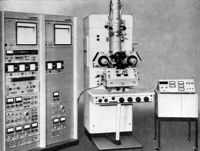
|
| General
|
| Year
|
1961
|
| Successor
|
none
|
| Magnification Range
|
|
| Magnification Gauge Type
|
|
| Specemin Chamber Pressure
|
|
| Power Consumption
|
|
| System Weight
|
|
|
| Electrion Source
|
| Accelerator Type
|
Single Stage Electron Gun
|
| Cathode Type
|
Tungsten Hairpin
|
| Accelerating Voltage
|
40, 60, 80, 100 KV
|
| Stability
|
2*10⁻⁵/min
|
| Cathode Heating Methode
|
AC
|
| Alignment Methode
|
X, Y, Mechanical
|
|
| Condensor
|
| Number of Condensor Lenses
|
2
|
| Current Stability
|
|
| Stigmator
|
Moveing Iron, Mechanical
|
| Minimum Spot Size Diameter
|
|
| Condensor Alignment
|
X, Y, and Tilt, Mechanical
|
| Lens Type
|
Electromagnetic
|
|
| Stage
|
| Holder Type
|
Cartridge, Top Entry
|
| X, Y Travel Range
|
± 0.8 mm
|
|
| Objective Lens
|
| Focal Length
|
|
| Adjustment Range
|
|
| Spherical Error
|
|
| Current Stability
|
|
| Stigmator
|
Moveing Iron, Mechanical
|
| Alignment Aids
|
|
| Point Resolution
|
|
| Lens Type
|
Electromagnetic
|
|
| Projective Lens
|
| Number of Projective Lens
|
1
|
| Current Stability
|
|
| Polpeace Configuration
|
4 Position Revolver
|
| Avalible Polpeace Magnifications
|
|
| Alignment
|
|
| Lens Type
|
Electromagnetic
|
|
Scanning Electron Microscops
| Autoscan
|
|
|
| General
|
| Year
|
1972
|
| Successor
|
none
|
| Magnification Range
|
20 - 550Kx
|
| Magnification Gauge Type
|
Analog, (Digital)
|
| Specemin Chamber Pressure
|
2 * 10-4 Torr
|
| Power Consumption
|
3 KVA
|
| System Weight
|
|
|
|
| Condensor
|
| Number of Condensor Lenses
|
3
|
| Current Stability
|
|
| Stigmator
|
none
|
| Minimum Spot Size Diameter
|
|
| Condensor Alignment
|
none, prealigned
|
| Lens Type
|
3 gap Common Coil Electromagnetic
|
|
| Stage
|
| Holder Type
|
|
| X, Y Travel Range
|
+- 12.5 mm
|
| Z Travel Range
|
25 mm
|
|
| Objective Lens
|
| Focal Length
|
|
| Adjustment Range
|
|
| Spherical Error
|
|
| Current Stability
|
|
| Stigmator
|
Dual Quadropol Electromagnetic
|
| Alignment Aids
|
|
| Point Resolution
|
7 nm
|
| Lens Type
|
Electromagnetic
|
|
References
- ↑ Geoffrey A. Meek, Practical Electron Microscopy for the Biologist, 2nd Edition (1976), Page 57
- ↑ Geoffrey A. Meek, Practical Electron Microscopy for the Biologist, 2nd Edition (1976), Page 58
- ↑ Geoffrey A. Meek, Practical Electron Microscopy for the Biologist, 2nd Edition (1976), Page 58
- ↑ K. Müller & E. Ruska, Ein vereinfachtest Elektromagnetisches Durschstahlungsmikroskop für Elektronen von 40 bis 60KV*), 1954
- ↑ K. Müller & E. Ruska, Ein Hilfselektronenmikroskop für Kurs- und Routinebetrieb, (1956), Vierter Internationaler Kongress für Elektronenmikroskopie, Physikalisch Technischer teil, Page 184-187
- ↑ Geoffrey A. Meek, Practical Electron Microscopy for the Biologist, 2nd Edition (1976), Page 489
- ↑ Geoffrey A. Meek, Practical Electron Microscopy for the Biologist, 1st Edition (1970), Page 235
- ↑ Geoffrey A. Meek, Practical Electron Microscopy for the Biologist, 2nd Edition (1976), Page 502
Categorie Entries
- Articles in Related to Siemens












